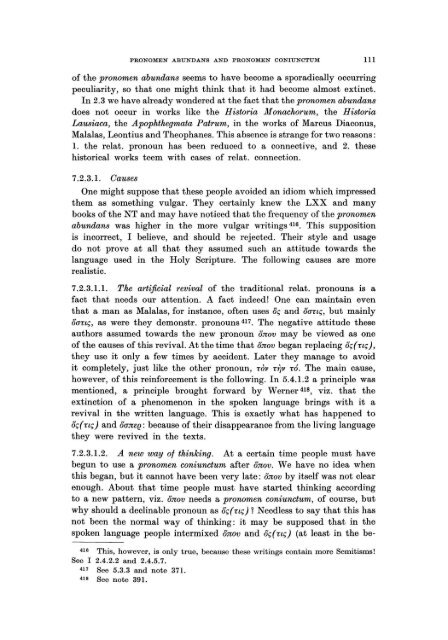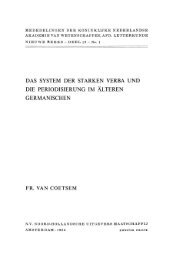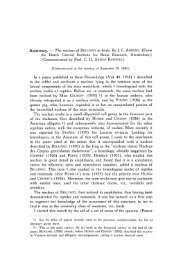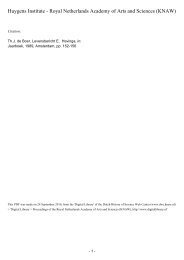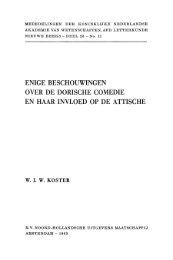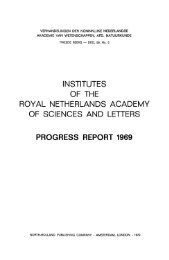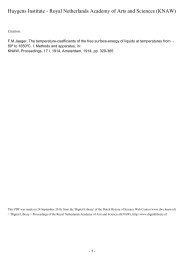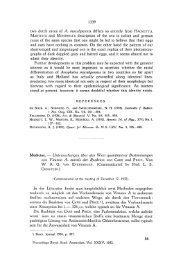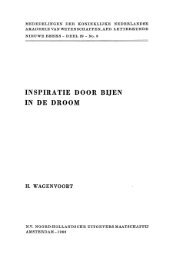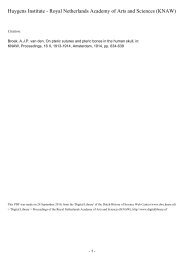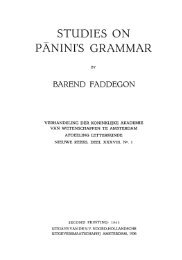Pronomen Abundans and Pronomen Coniunctum. A ... - DWC
Pronomen Abundans and Pronomen Coniunctum. A ... - DWC
Pronomen Abundans and Pronomen Coniunctum. A ... - DWC
Create successful ePaper yourself
Turn your PDF publications into a flip-book with our unique Google optimized e-Paper software.
PRONOMEN ABUNDAN8 AND PRONOMEN CONIUNCTUM 111<br />
of the pronomen abundans 8eems to have become a sporadically occurring<br />
peculiarity, so that one might think that it had become almost extinct.<br />
In 2.3 we have already wondered at the fa ct that the pronomen abundans<br />
does not occur in works like the Historia Monachorum, the Historia<br />
Lausiaca, the Apophthegmata Patrum, in the works of Marcus Diaconus,<br />
Malalas, Leontius <strong>and</strong> Theophanes. This absence is strange for two reasons :<br />
1. the relat. pronoun has been reduced to a connective, <strong>and</strong> 2. these<br />
historical works teem with cases of relat. connection.<br />
7.2.3.1. Causes<br />
One might suppose that these people avoided an idiom which impressed<br />
them as something vulgar. They certainly knew the LXX <strong>and</strong> many<br />
books of the NT <strong>and</strong> may have noticed that the frequency of the pronomen<br />
abundans was higher in the more vulgar writings 416. This supposition<br />
is incorrect, I believe, <strong>and</strong> should be rejected. Their style <strong>and</strong> usage<br />
do not prove at all that they assumed such an attitude towards the<br />
language used in the Holy Scripture. The following causes are more<br />
realistic.<br />
7.2.3.1.1. The artificial revival of the traditional relat. pronouns is a<br />
fact that needs our attention. A fact indeed! One can maintain even<br />
that a man as Malalas, for instance, of ten uses 8ç <strong>and</strong> oauç, but mainly<br />
oar:tç, as were they demonstI'. pronouns 417. The negative attitude these<br />
authors assumed towards the new pronoun onov may be viewed as one<br />
of the causes of this revival. At the time that önov began replacing oç(rtç),<br />
they use it only a few times by accident. Later they manage to avoid<br />
it completely, just like the other pronoun, rdv r~v ró. The main cause,<br />
however, of this reinforcement is the following. In 5.4.1.2 a principle was<br />
mentioned, a principle brought forward by Werner 418, viz. that the<br />
extinction of a phenomenon in the spoken language brings with it a<br />
revival in the written language. This is exactly what has happened to<br />
oç( uç) <strong>and</strong> öan€(!: because of theit disappearance from the living language<br />
they were revived in the texts.<br />
7.2.3.1.2. A new way of thinking. At a certain time people must have<br />
begun to use a pronomen coniunctum aftel' önov. We have no idea when<br />
this began, but it cannot have been very late: önov by itself was not clear<br />
enough. About that time people must have started thinking according<br />
to a new pattern, viz. önov noods a pronomen coniunctum, of course, but<br />
why should a declinable pronoun as oç(uç)? Needless to say that this has<br />
not been the normal way of thinking: it may be supposed that in the<br />
spoken language people intermixed önov <strong>and</strong> öç(uç) (at least in the be-<br />
416 This, ho wever, is only true, because these writings contain more Semitisms!<br />
See I 2.4.2.2 <strong>and</strong> 2.4.5.7.<br />
417 See 5.3.3 <strong>and</strong> note 371.<br />
418 See note 391.


